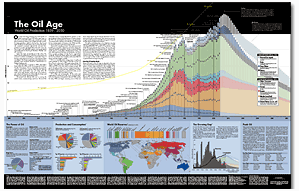 Topic: economics, investing
Topic: economics, investingInteresting chart from: The Oil Age Poster. There are all sorts of opinions on the future price of oil.
My view is based in the capitalist/market model - I believe that if it becomes obvious we are running out of oil the price will go up drastically. Those who own it will feel if you don't buy it today they will sell it to you for much more later. And those that want it don't have much choice (as the last several spikes in oil prices show - demand does not decline without enormous price increases).
Huge price increases will provide incentives to those in the market to innovate to find alternative ways to make money by providing usable energy sources. If the market, overall, chooses to look forward over a long period of time, then investment in alternatives will begin in earnest early and prices of oil will slowly rise. And as prices rise slowly new alternatives (including ways of reducing consumption) will slowly come into the market. Those alternatives will slowly substitute for oil as a smooth transition is made.
If markets actual were efficient and driven by looking far into the future and discounting cash flows to the present this slow and steady model is what would happen. The market can only be efficient if good long term predictions can be reflected in the market. If for example, there is proof we will run out of oil soon but those with the ability to effect the market did not understand this data the market can remain inefficient (the market can fail to reflect the information that is available in an efficient manner leaving room for those with the knowledge to gain above market returns on their investments).
On the other hand if there is no real knowledge (say with a chaotic system where it is impossible to predict far into the future) someone can still "predict" and they could be right by pure luck. A market failure to include that would not be inefficient there was no true prediction that an efficient market should have incorporated. In efficient market theory those with knowledge exert a sufficient impact on the market to make the market efficient.
Markets often take wild and crazy swings with little change in long term prospects which is only reason to question the validity of pure market efficiency. Also, short term pressures lead people to take action for short term benefits (say selling their oil today even if they believe they could sell it for much more 5 years later) instead of making rational long term economic decisions. In a case with a less than purely efficient and less than perfect knowledge of the future, the market will still work to provide alternative energy sources but it will be much more chaotic.
In this case, instead of many investors achieving reasonable ("market") returns as the market behaves rationally they will get huge returns if they are right and huge losses if they are wrong. Those that are right in investing in energy alternatives will make huge returns as the market as a whole waits to invest until the evidence is beyond question (instead of anticipating based on long term thinking and long term investing) and chaotic spikes occur. If that happens the early investors will find a ready market for their alternatives in the market and make a huge return before competitors can react. Or those early investors will lose huge percentages as they invest in alternatives and they lose as oil stays cheap.
Good luck figuring out what will happen. If you are right and invest with some intelligence you can make quite a bit of money (as you can see below, I invested some with the expectation that energy prices would increase).
Related Posts:
No comments:
Post a Comment